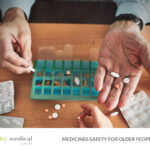With international borders open and local getaways booming, Australians are back on the move. Whether you are flying overseas or road-tripping across Queensland, travel is back on the agenda but so is the risk of a travel tummy if you are not careful.
However, changes in time zones, diet, sleep and stress levels can upset your gut, leading to common digestive problems such as traveller’s diarrhoea, constipation and indigestion often referred to as a travel tummy. These conditions can quickly turn an exciting holiday into an uncomfortable experience.
We know how important your gut health is while travelling. This article will explore the most common travel tummy troubles, their causes and how to prevent or manage symptoms so you can stay well on your journey.
What You’ll Learn in This Blog
- Why travel affects digestion
- Common types of digestive issues while travelling
- Tips to prevent tummy upsets during travel
- Simple remedies for diarrhoea, constipation and indigestion
- When to seek medical care from your GP
Diarrhoea While Travelling: The Most Common Gut Issue
Travel diarrhoea is the leading cause of digestive discomfort during holidays. It usually results in frequent, loose and watery stools, often accompanied by stomach cramps and an urgent need for the bathroom.
In many cases, it is caused by consuming contaminated food or water. However, stress and sudden dietary changes can also trigger it especially in people with a sensitive digestive system or conditions like irritable bowel syndrome (IBS).
How to Prevent Traveller’s Diarrhoea
To reduce your risk of diarrhoea while travelling:
- Drink bottled water only – Use sealed bottled water for drinking and brushing your teeth. Avoid tap water, ice cubes and street vendor drinks in unfamiliar regions.
- Eat freshly cooked food – Choose meals that are served hot and prepared fresh. Avoid raw vegetables, cold buffets or food sitting out in warm environments.
- Practise good hygiene – Wash your hands with soap and clean water before eating. Carry alcohol-based sanitiser for convenience.
How to Treat Diarrhoea on Holiday
If you do experience diarrhoea while travelling:
- Stay hydrated – Drink plenty of water or electrolyte drinks to replace fluids and avoid dehydration.
- Use anti-diarrhoeal medication – Over-the-counter remedies like loperamide (Imodium) or bismuth subsalicylate (Pepto-Bismol) can ease cramping and reduce urgency.
- Know when to see a GP – Seek medical attention if you have severe abdominal pain, bloody stool, high fever or if diarrhoea lasts more than five days.
Constipation During Travel: A Common Disruption
While many people expect diarrhoea, travel constipation is just as common. Long-haul flights, changes in routine, dehydration and reduced activity can cause your bowels to slow down.
Constipation on holidays can lead to discomfort, bloating and feeling sluggish not ideal when you are trying to relax and enjoy your trip.
How to Prevent Constipation When Travelling
- Eat fibre-rich foods – Prioritise fruits (such as apples, pears and berries), vegetables, legumes and whole grains. Consider a fibre supplement if you are prone to constipation.
- Increase fluid intake – Fibre works best with adequate water. Stay well-hydrated, especially when flying or in warmer climates.
- Keep active – Movement helps stimulate digestion. Take short walks during flights or long car trips to maintain regular bowel function.
How to Relieve Constipation
- Take bulk-forming laxatives – Fibre supplements can help regulate bowel movements. Be sure to follow directions and drink plenty of fluids.
- Use stool softeners if needed – it can soften stools and make them easier to pass.
- See your GP if symptoms persist – Ongoing constipation may require a more comprehensive treatment plan.
Indigestion While Travelling: Eating Too Much, Too Fast
Trying new foods or eating larger meals than usual often leads to indigestion during travel. This condition may cause bloating, upper abdominal discomfort, nausea or heartburn all of which can ruin your travel experience.
How to Avoid Indigestion While Travelling
- Eat smaller portions – Instead of large meals, opt for smaller, more frequent servings to reduce stress on your stomach.
- Limit alcohol and caffeine – Both can irritate the digestive tract and trigger symptoms like reflux or bloating.
- Avoid common trigger foods – People with IBS or food intolerances should steer clear of FODMAP-rich foods such as dairy, garlic, onions, beans and wheat.
- Eat slowly and mindfully – Chewing properly and eating calmly can prevent excess gas and aid digestion.
How to Soothe Indigestion
- Use antacids or acid reducers – Medications like omeprazole or famotidine can reduce acid and ease heartburn.
- Take anti-gas remedies – Simethicone products can help relieve bloating and discomfort.
- Try bismuth subsalicylate – Useful for general indigestion and mild nausea.
- Consult your doctor if symptoms recur – Frequent indigestion may point to a more serious condition that needs medical investigation.
Conclusion: Protect Your Gut While You Travel
Your digestive system is sensitive to change especially during travel. But by being mindful of what you eat and drink, staying hydrated and keeping a few key remedies on hand, you can avoid most common travel tummy troubles.
Whether you are travelling overseas, exploring the Australian outback or enjoying a coastal getaway in Queensland, good digestive health means a smoother, more enjoyable trip.
Do not ignore persistent symptoms. If tummy issues linger once you are back home, it is time to speak with your GP.
How Berkeley Medical Centre Can Support You
At Berkeley Medical Centre in Brisbane, we provide a full range of travel health support services. Our experienced General Practitioners (GPs) offer:
- Pre-travel health checks and advice
- Recommendations for over-the-counter digestive remedies
- Guidance on gut health and food intolerances
- Ongoing care for chronic digestive conditions
- Post-travel follow-ups if symptoms persist
With our team of GPs and allied health professionals, you can travel with peace of mind knowing your health is in safe hands.







